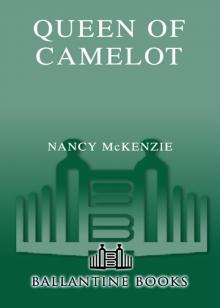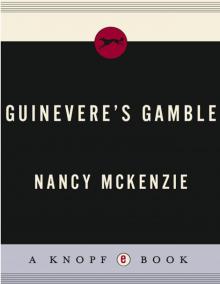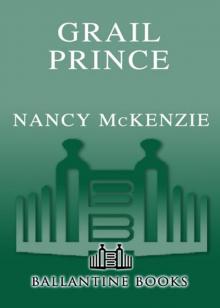- Home
- Nancy McKenzie
Grail Prince Page 33
Grail Prince Read online
Page 33
With an effort the boy stilled himself and faced the King.
“For your sake, my lord, I will greet him as your battle captain. As your Companion. As king of my homeland. And . . . and as your friend.”
Arthur placed both hands on the boy’s shoulders and gazed into his face. Galahad trembled beneath that searching look.
“Not,” Arthur said very softly, “as your father?”
“No. Sir, I cannot.”
Arthur sighed deeply, and dropped his hands. “I cannot ask for what you cannot give. I will take what you offer me. You are bound by this oath, Galahad.”
“Yes, my lord. I am bound.”
“I wonder,” Arthur murmured as the boy made his reverence and turned to leave, “if Gareth is the real source of all your pain. Had he died in battle, you would not feel so. There is something else hounding you, isn’t there, son?”
Galahad fled from the tent.
28
THE STOWAWAY
Galahad knelt on the forest floor. All around him the great pines kept silent watch beneath the sliding stars. Small creatures rustled in the underbrush, now and then an owl called to its mate, and dark wings fluttered on the edge of sound far above his head. This was night’s music, the song of the hallowed dark, and he welcomed it.
He bent his head in prayer. It was so hard to be a good soldier, to be like Arthur, to think of nothing but the coming fight and Britain’s need. Why could he not forgive his father? Everyone else could. Why should it gall him that his father was so beloved, even after five years’ banishment? Why did Aidan’s tortured voice still ring in his ears? Sin is anathema and those who commit it. Put them all away.
From the bushes behind him came a stifled sob. He whirled and drew his sword. “Who’s there? Show yourself.” The sound ceased abruptly. Nothing moved. Even the owls were still. “Declare yourself, or it shall fare the worse for you. Come out, or I’ll call the High King’s men!”
The bushes trembled, then parted. Slowly a boy crawled out. All Galahad could see of him were large, glistening eyes in a filthy face.
“Come forward into the moonlight. I will not harm you unless you try to flee.” He sheathed his sword and beckoned the youngster out. The boy was slightly built, thin to the point of weakness, and his ragged clothing hung limply from his body. But he did not carry himself like a beggar or a thief.
“Who are you?”
The boy looked up and twisted his hands together. “Please, my lord, do not ask me. Let me go, I beg you. Let me hide.”
“Give me your name.”
“Oh, no, I dare not!”
Galahad’s hand went to the hilt of his sword. “Give me your name.” The boy bit his lip, backing away. “In the name of Arthur, to whom you shall go if you evade me, give me your name and family!”
The boy fell to his knees and clasped his hands before him. “Oh, sir knight, I pray you, don’t take me to the High King. He would give me into my father’s hands, and I have disobeyed him!”
Galahad looked at him with new interest. “Indeed? What have you done? Have you killed anyone?”
“Oh, no! I’m not old enough—or strong enough—and besides”—he gulped suddenly—“I’m not sure I could.”
“What a strange accent you speak. Are you an Irish dog?”
“Oh, no, my lord! I am a Briton. And a loyal one.”
Galahad hesitated. The youngster’s collarbones stood out so far from his flesh they cast shadows even in moonlight.
“How long has it been since you have eaten?”
The boy licked his lips and swallowed. “Days and days,” he whispered. “Not since I left home.”
“How did you get here? Who protects you? You cannot be a soldier, nor a page either, by the look of you.”
Miserably, the boy shook his head. “My lord, I am a stowaway.”
“Are you indeed? Is that what you have done? Disobeyed your father and stowed away to war? Sit here in the shadow of this tree. No one will see you. I have some jerky and a heel of bread, and a small skin of wine. For such courage you shall live until morning.”
“Oh, sir knight, I thank you!” The boy grabbed his hand and kissed his fingers.
Galahad recoiled in surprise. “I am not a knight. Here. Eat. Perhaps it will give you the spine to tell me who you are.”
When he saw how the boy attacked the food, Galahad believed his story. After he had finished and taken a long pull at the wineskin, the boy sat back, licking his fingers, and looked up at Galahad.
“Thank you, sir. May God and his angels bless your kindness. I think you saved my life.”
Galahad grunted and sat beside him on the soft carpet of pine needles. “At least you are a Christian. Your clothes aren’t much, but your manners speak of good breeding. You must have been raised in a civilized house.”
The boy faced him, chewing his lip, and suddenly nodded. “My name is Percival, my lord. My father is Maelgon, King of Gwynedd.”
Galahad whistled softly. “Prince of Gwynedd! How old are you?”
“Eleven, my lord, near the time of the last equinox.”
“That’s my birthday, too. I am fourteen.”
Percival looked at him shyly. “You look older. I suppose it’s because you’re so tall. I took you for a king. You must be a king’s son, at least.”
“My name is Galahad.”
Percival gasped. “Galahad! You are Lancelot’s son! Why, we are cousins— your mother was my father’s sister.” He threw his thin arms around Galahad and hugged him tightly. Awkwardly, Galahad returned the boy’s embrace.
“Be welcome, cousin. All my mother’s kin are dear to me, for her sake. But why is it I don’t know you? Your father has been to Camelot many times, yet not with you.”
“He never takes me anywhere,” Percival grumbled, straightening his filthy tunic. “I’ve never been out of our own valley, if you can believe it, until now. I don’t know how he expects me to learn about the world if I don’t see it. But he’s well known to be shortsighted. I suppose he expects to live forever.”
Galahad smiled. “So you saw your chance and took it. I like your spirit. And what did you expect to happen here in Less Britain, if you must keep hidden from your father?”
Percival grinned. “I suppose, like my father, I didn’t give it enough thought. Truly, Galahad, God sent you in answer to my prayers. I thought for certain I should die here of starvation before the battle even began!”
“You might have. We are a long way yet from battle. Do you expect to fight in it?”
“I expect to try,” Percival said firmly, lifting his chin. “Will you stop me?”
Galahad smiled. “I will do all I can to help you. But I thought you said you couldn’t kill anyone.”
“Well . . . there’s a first time for everyone. When I don’t think about it too much, it seems an easy thing to do.”
“And where is your sword?”
Percival gulped. “I, well, I don’t have one yet. But I have an excellent dagger.” He drew this from his belt, raising the blade so it shone milk-white in the moonlight. Gravely, Galahad admired it. It was a fine, heavy weapon with a keen edge; it would take strength to throw.
“It’s beautiful. Have you practiced with it?”
“Yes. I’m . . . I’m pretty good, too, until my arm gets tired.” His eyes slid to Galahad’s hip. “But you have a sword.”
Galahad drew it and let him hold it, get a feel of the balance. “When you fight with it—when it crosses another sword—you can feel the life in the blade. It moves by itself, almost.”
Percival’s eyes shone with admiration. “I wish I had one! My father won’t allow it. I have to wait until I’m fifteen to start sword training.”
“Fifteen!” Galahad cried. “Why, that’s unheard of, surely, even in Wales! I started when I was nine.”
“But you were in Camelot. There is no backwater in all of Britain like Gwynedd.” Percival lifted the sword, which shone deadly pale in the dark. “And I
bet you have a fine horse as well. I have a runt, little better than a pony. Not fit for a prince of any age.”
Galahad smiled at the boy’s disgust, remembering his own envy of Cordovic’s mare. “Yes, I have a fine horse. A young stallion from the High King’s stables. His name is Farouk. He’s still on shipboard. All the horses should be ashore by morning. Then we can go down and get him.”
“We?” Percival spoke bitterly. “You, you mean. I’m not going anywhere in daylight.”
“Then how are you going to fight in this battle? Are you going to sneak along behind the army all the way to Kerrec? It’s a walled town, you know. And there are outlaws in the forest. How will you eat? Your clothes are almost gone. Who will you fight under? Who can protect you, if you stay in hiding?”
Percival handed him back the sword. “I left that part to God. And He sent me to you. Why can’t I fight with you?”
Galahad shifted uncomfortably. “Go to your father and beg him to accept you, now that you’ve come across. What you did took courage. Perhaps he’ll let you stay and serve Gwynedd.”
“You don’t know my father. First he’ll whip me; then he’ll hold me up to public scorn; then he’ll put me on the next ship back. He’ll take it as a slight that I came against his orders. No. I’m not going to my father.”
“I suppose you did ask him straight out to let you come?”
“Of course! I pleaded. I begged. I fasted. He would not listen. He said I was too young. And he well knows the King takes youths my age as pages. But he would not allow it. He gave all the usual excuses. The truth is, I’m his only son and my mother is afraid. She fears everyone will die in this campaign. She made my father promise not to take me and he agreed because he, too, is afraid.” He said this sadly, plucking pine needles from his leggings and averting his eyes. Galahad felt a sudden rush of great liking for this boy whose father was such a disappointment to him.
“Will not your mother get word to him when she discovers your absence? The courier may already be upon the sea.”
Percival brightened. “Oh, no. My sister has seen to that.”
“Your sister?”
“My sister, Dane. We are twins. She is a wonder, Galahad; she is afraid of nothing. She helped me get aboard the ship without being seen. By now she will have told my mother that at the last, my father relented and brought me with him. She will have given Mother one of Father’s rings as a token of it.” He giggled in delight. “We stole the ring a month ago, when he first refused me. It was Dane’s plan. She can always tell what Father will do long before he does it, or even knows himself.”
“Does she not risk your mother’s anger when the ruse is discovered?”
Percival sobered. “She risks a great deal. But by the time the news gets home, we shall have won the battle and be returning victorious. At least, that is the plan.”
“Then you had better fight in the battle.”
“Let me fight with you, Galahad.”
Galahad frowned. “You can fight with Lanascol. My uncle Galyn is your kinsman by marriage. He has room for one more bedroll in his tent.”
Percival’s restless fingers stripped a pine twig of its needles, and he stabbed the ground with it in irritation. “My father would demand my return. Would your uncle dare to deny him his rights? No, he could not do it. King Arthur would not allow dissension within his ranks, and I don’t want to be the cause of argument. Why can’t I fight with you? You are Lancelot’s son—my father would not cross Lancelot for all the world.”
“You can’t fight with me. We must think of another way.”
“But why not? We were meant to be together, don’t you see? God sent me straight to you as soon as we landed. Tonight, as I was hunting about for scraps, I came across the tent you guarded and saw you there. Later, you came out to my hiding place and found me. You were led. It’s a sign. Please, cousin, let me serve you.”
“But you can’t fight with me,” Galahad said desperately, “because . . . I’m not going to fight.”
“What?” Percival stared blankly at him. “What do you mean, not fight!”
Galahad drew a deep breath. “I serve Arthur, not Lancelot. And I’m not old enough for the army.”
“So what? You’re not a common soldier; you’re Lancelot’s son.”
“Arthur can’t break his own rules just for me.”
“But that’s nonsense!” Percival sputtered. “Fight with Lanascol, then! You said yourself there’s room for you there. Lancelot would let you fight, however old you are. He’d never be afraid, like my father.”
Galahad looked grim. “I don’t serve Lancelot. I’m in Arthur’s service.”
“But they’re best friends. Surely the King will let you go.”
“He said he would. But I refused his offer.” Percival stared at him incredulously. Galahad added stiffly, “I’m not afraid. But I won’t fight under my father.”
“When the future of Britain is at stake? In God’s holy name, why not?” Galahad’s eyes, dark in the moonlight, glittered hard like precious stones. “Because. I just can’t.”
“Of course you can! It would be a great honor to fight in Lancelot’s company.”
“Not if . . . not if you couldn’t obey his command. And I couldn’t.” Percival looked quickly away and Galahad flushed. “I’m not afraid! I . . . I don’t shy at killing. It’s just that . . . I can’t forgive him. I’ve tried to, but I can’t. He is my enemy. That’s why I can’t serve him.”
“Forgive?” Percival said softly. “What has he done?” Galahad said nothing. Percival peered into his face. “Come on, cousin. What can he possibly have done, a man like Lancelot? Why, I would trade him for my father in a heartbeat!”
Galahad lifted his sword into the moonlight. “He killed the man who owned this sword.”
“I thought it was your sword.”
“It is now. King Arthur gave it to me the night its owner died. And the man who owned it . . . was my friend.” He laid the sword across his knees. “Look at the hilt. Can you see the sea serpents? That is Orkney’s badge. This sword belonged to the High King’s nephew, Gareth of Orkney.” Quickly he sketched in the events of that awful November night.
“So that’s why everyone wants to see what happens when Sir Gawaine comes face-to-face with Lancelot!” Percival cried. “But why would Lancelot kill Sir Gareth, if he had come to Lancelot’s aid?”
“According to Arthur, he didn’t mean to do it.” Galahad’s face grew hot. “It wouldn’t have happened—none of it would have happened—if he hadn’t been in the High Queen’s chamber!”
“Oh!” Percival gazed at his cousin. “What was he doing there?”
The innocence of the question took the heat from Galahad’s fire. He scowled. “The King had sent a courier to the Queen with a message to share with Lancelot. The hour was late and she was already abed. So she sent for the regent in her chamber. She was well attended, the King says, and so was Lancelot.”
“Well, of course they were. Where’s the harm in that?”
“I’ve just told you what harm came of it.”
“But that wasn’t Lancelot’s fault.”
“It was,” Galahad said slowly. “He didn’t go to her chamber just as regent. He has loved her, he has worshiped her, since the day he met her. He has loved her all these years, and he has never loved any other woman.”
Percival gazed at him steadily. “If he went to her at the Queen’s command, you can’t blame him for it.”
“He was regent. He could have commanded her to come out.”
“Oh, come on, Galahad. When Father’s away in Camelot it’s my mother who rules Gwynedd, no matter whom my father has appointed. You’re blaming him for the wrong thing.”
“He murdered Gareth.”
“An accidental killing. Which he must regret as much as you.”
“If he hadn’t been there, it never would have happened. Gareth’s brothers were trying to catch the pair together—and they did.”
; “Catch them at what? Were they abed?”
Galahad shrugged. “No.”
“Then what you really blame him for is loving the High Queen.”
Galahad sprang to his feet. “Yes! That is his sin! He loved her, he has always loved her past bearing—and he cared nothing for my mother!” Percival shrank back against the tree. “He never cared a straw for her. He took her from her home in Britain and never let her go back, even to visit. He was cruel to her; he made her weep. And all because he loved another woman. The High King’s wife. A woman he couldn’t have.” He stopped, shaking, and looked down at the wide-eyed boy. “I ought not to have said all that. I beg your pardon. But it is a stain so black, so deep, so permanent, I can hardly breathe, sometimes, for the shame of it.”
Percival rose to his knees and clasped his hands before his face. “Oh, cousin, do not be ashamed on my account; I will pardon you anything. Let me serve you, Galahad. Let me serve you and, through you, the King.”
Galahad sheathed his sword. “You are Prince of Gywnedd, Percival. You cannot serve me.”
“Oh, please, Galahad—I must take service somewhere if I am not to be sent home, and I would rather serve you than anyone. Please.”
After a moment’s hesitation, Galahad raised him and slid an arm around his shoulders.
“Let me take you straight to Arthur. He is the only one who could overrule your father in this matter. Since you have been so kind to me, I will do you a kindness in return. I will plead with him on your behalf.”
The boy’s mouth dropped open. “Do you know him so well? He will listen to you?”
“He listens to everyone. In the morning I will take you to him.”
“Galahad.” Percival gulped. “Does he know that Lancelot . . . loves Guinevere?”
“Oh, yes,” Galahad replied sadly. “He knows. He has known that for a very long time.”
29
PRINCE OF GWYNEDD
Arthur stood half-naked at the washbasin, splashing icy water over his face and chest and arms, when his chamberlain, Varric, ushered the boys inside the tent at dawn. Percival huddled behind Galahad, trembling uncontrollably.

 Guinevere's Gift
Guinevere's Gift Queen of Camelot
Queen of Camelot Guinevere's Gamble
Guinevere's Gamble Grail Prince
Grail Prince Prince of Dreams
Prince of Dreams